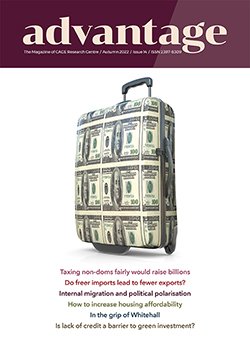Advantage Magazine - Autumn 2022

Advantage Magazine - Autumn 2022
Tuesday 27 Sep 2022Download the magazine
DownloadWelcome to this issue of Advantage Magazine…

In this issue...
Taxing non-doms fairly would raise billions
Arun Advani, David Burgherr and Andy Summers
Tipping the balance: do freer imports lead to fewer exports?
Holger Breinlich, Elsa Leromain, Dennis Novy and Thomas Sampson
Internal migration and political polarisation: Is the big sort happening in the UK?
Vincenzo Bove, Georgios Efthyvoulou and Harry Pickard
How to increase housing affordability: Understanding local deterrents to building more
Amrita Kulka
In the grip of Whitehall: How central government is stifling local democracy
Ben Lockwood, Francesco Porcelli and James Rockey
Is lack of credit a barrier to green investment?
Antonio Accetturo, Giorgia Barboni, Michele Cascarano, Emilia Garcia-Appendini and Marco Tomasi
Parting shot
Arun Advani
Boris Johnson’s term as PM has ended, but Johnsonian ‘levelling up’ is continuing to shape the research agenda. Localism is certainly the watchword in this edition of Advantage. From the local effects of international trade, to politically-responsive migration between local areas, to local barriers to spending and house building (a theme Liz Truss has recently picked up), we have it covered.
One group whose interests stretch beyond the local are the UK’s non-doms, who do not pay UK tax on their foreign investments. Removal of this perk could raise much-needed cash for the place they currently call home. And crucially, Arun Advani argues, it wouldn’t discourage non-doms from living in the UK.
Trade agreements are high on the UK’s agenda right now. Holger Breinlich et al. look how relaxing import restrictions affects exports. Using data from US–China trade relations, they find that while the overall prognosis is good, there are winners and losers at the industry level.
We’re no more than two (and a bit) years away from a general election, but parties may find it increasingly difficult to sway set local opinions. Evidence from Vincenzo Bove et al. on internal migration suggests we could be gradually self-sorting into regional political bubbles.
The housing affordability crisis is having an impact on regions across the UK. Amrita Kulka’s assessment of how adjusting housing regulations affects the number and price of homes in different areas shows that one policy solution will not fit all.
If policy affects local regions differently, perhaps local authorities need more autonomy; Yet Ben Lockwood et al. find that local governments are so financially constrained, party politics has no real effect on local fiscal choices.
In our final article, Antonio Accetturo et al. ask whether lack of credit supply is a barrier to firms investing in green technologies. Here too, local factors are at play. Local opinion and local financial incentives influence firms’ decisions on green investments.
Locality shapes the effectiveness of policy. Despite the many transgressions of our outgoing Prime Minister, his insight that geographic inequalities in the UK are a real constraint on people’s life chances is fundamentally sound.
Stephanie Seavers, Editor
